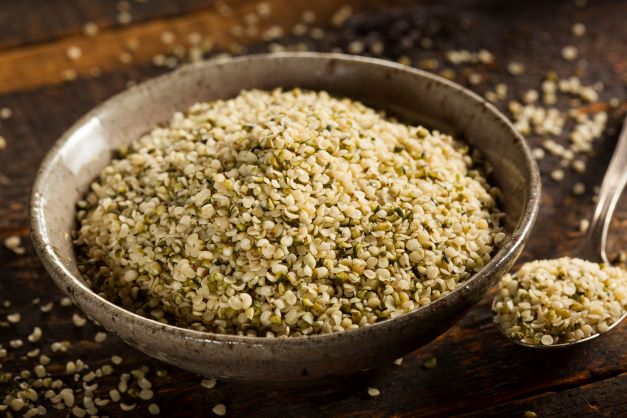Home
Low-THC hemp as food
Low-THC hemp as food

Hulled hemp seeds
The sale of food produced from low-delta 9-tetrahydrocannabinol (THC) hemp was legalised in Australia and New Zealand on 12 November 2017. This decision followed extensive research that determined there were no food safety risks associated with low-THC hemp seed food products provided they meet the requirements under the Australia New Zealand Food Standards Code (the Code).
What are low-THC hemp seed foods?
Low-THC hemp seed food are foods or ingredients in food that are derived from the hulled seed of low-THC hemp plants. The hemp plant is a species of the plant Cannabis sativa which is grown specifically for industrial purposes and is different to other varieties of C. sativa as it contains no, or very low levels of THC.
Low-THC hemp seed foods include products such as hulled hemp seed, hemp seed oil, hemp seed beverages, hemp flour, hemp protein powder and mixed foods.
How is low-THC hemp regulated?
Industrial hemp activities in Western Australia are regulated under the Industrial Hemp Act 2004. To cultivate, harvest or process industrial hemp for food or fibre on a commercial scale an industrial hemp licence is required with the Department of Primary Industries and Regional Development. Licensees must only use approved seed or planting sources and industrial hemp must not contain more than 1.0% of THC.
Food safety standards for the production and sale of food in Western Australia are set out under the provisions of the Code which is regulated under the Food Act 2008 and Food Regulations 2009. These requirements are monitored and enforced by local government and the Department of Health.
Requirements of the Food Standards Code
Standard 1.4.4 of the Code only permits the sale of hemp seeds and seed products derived from low-THC C. sativa plants. This means the leaves and flowering heads of the plant must not contain more than 1.0% THC. All other species of Cannabis plants are prohibited in food.
The requirements for low-THC hemp seeds and seed products are:
Hemp seeds
- The seeds are of a C. sativa plant and the leaves and flowering heads of the plant must not contain more than 1.0% THC.
- The seeds must not contain more than 5 mg/kg of total THC.
- Seeds for retail sale must be non-viable (unable to germinate) and hulled (outer coat has been removed).
Hemp oil
- The oil extracted from the seeds which can include viable and unhulled seeds, must not contain more than 10 mg/kg of total THC.
Hemp beverage
- A beverage derived from the seeds which can include viable and unhulled seeds, must not contain more than 0.2 mg/kg of total THC.
Hemp flour, protein powder, mixed foods
- Any other product that’s derived or extracted from the seeds which can include viable and unhulled seeds, must not contain more than 5 mg/kg of total THC.
Cannabidiol levels
- The only cannabinoids (CBD) in the seeds are naturally occurring in or on the seeds.
- The CBD level in any food for sale must not exceed 75 mg/kg.
Labelling
- The label for the food must not imply or suggest that the product has a psychoactive effect.
- The label must not include a nutrition content or health claim about CBD.
- The label must not contain an image or representation of any part of the C. sativa plant (including the leaf of that plant) other than the seed.
- The label must not include the words cannabis, marijuana or words of similar meaning.
More information
For food related queries email foodsafety@health.wa.gov.au
Last reviewed: 12-12-2022
Produced by
Environmental Health Directorate